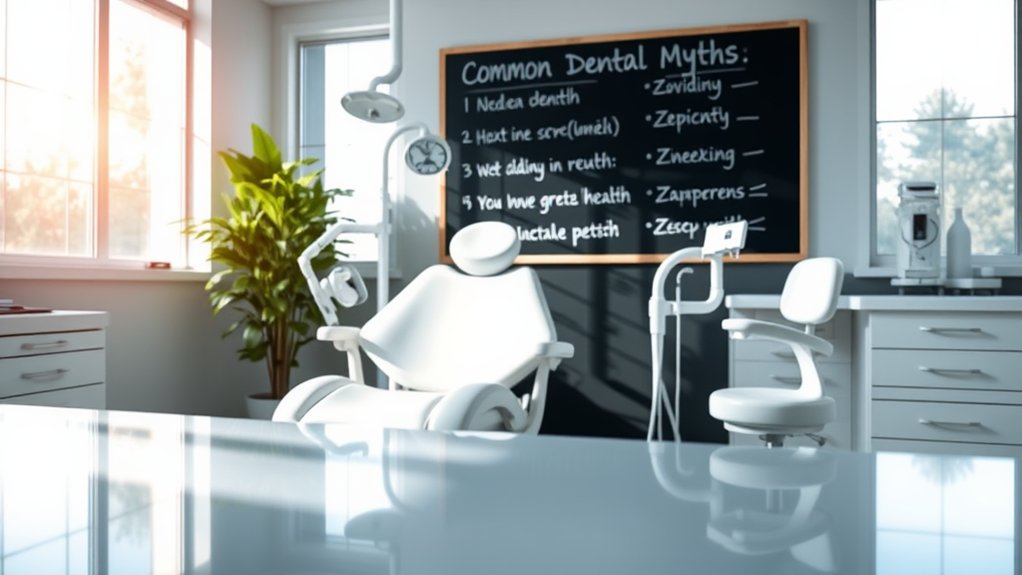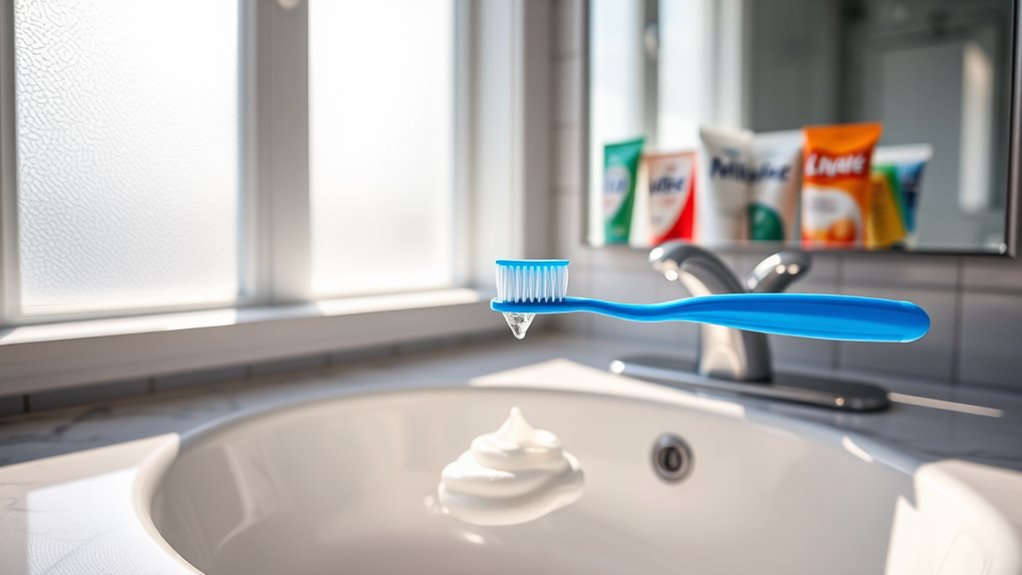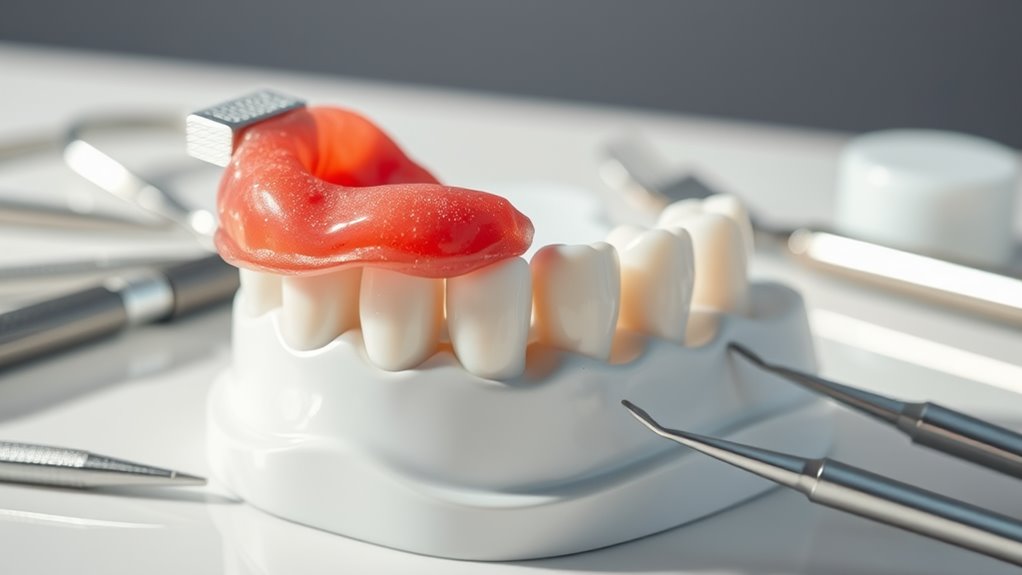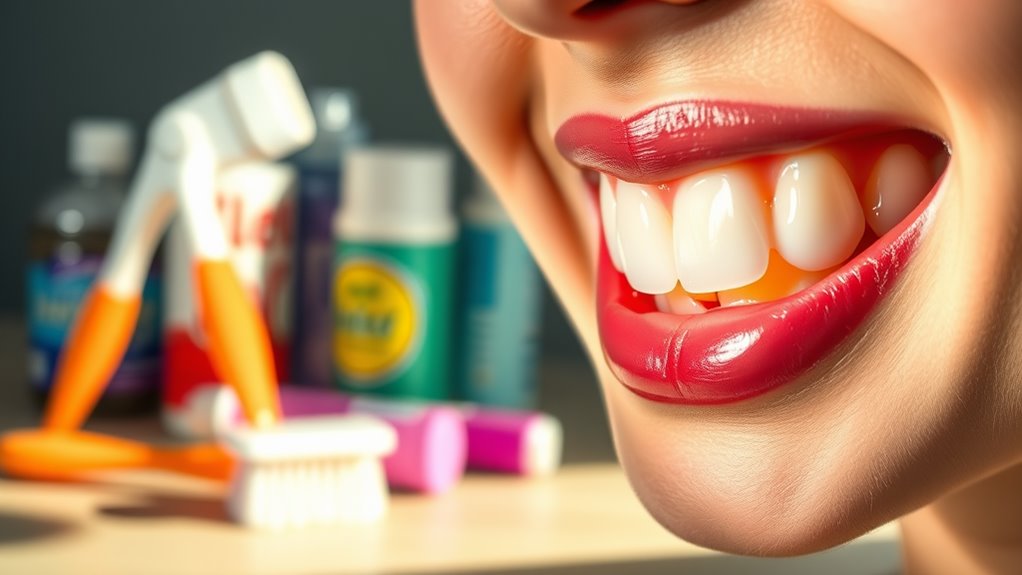Debunking 10 Common Dental Myths
You might believe some common dental myths, but it’s time to separate fact from fiction. For instance, brushing harder doesn’t always equal cleaner teeth, and your pearly whites don’t necessarily signal good oral health. Misconceptions like these can impact your dental hygiene routine significantly. So, what’s the truth behind these myths? Understanding the realities can help you maintain better oral health and avoid costly mistakes. Let’s explore the key myths and the facts that contradict them.
Key Takeaways
- Brushing harder does not clean better; soft-bristled toothbrushes and gentle motions are more effective and protect enamel and gums.
- White teeth can hide underlying issues; good oral health is not solely determined by tooth color.
- Frequent dental visits are essential; problems may be asymptomatic, and early detection prevents more serious health issues.
- Gum bleeding isn’t normal; it can indicate gum disease, necessitating prompt attention to prevent further complications.
- Dental treatments wear down over time; regular maintenance is crucial to prolong their effectiveness and manage expectations.
Brushing Harder Leads to Cleaner Teeth
While many people believe that brushing harder will remove more plaque and lead to cleaner teeth, this is a common misconception.
In reality, you can damage your enamel and irritate your gums by applying excessive pressure. Instead, it’s more effective to use a soft-bristled toothbrush and gentle, circular motions. Additionally, proper technique involves holding the brush at a 45-degree angle and using short, gentle strokes.
The key to effective brushing isn’t force but technique and duration—aiming for at least two minutes twice a day.
By understanding these dental myths debunked, you can maintain better oral hygiene and protect your teeth.
Sugar Is the Only Cause of Cavities
Although sugar is often blamed for cavities, it’s not the only culprit in tooth decay. Other carbohydrates, like starches and refined grains, can also contribute to the problem.
When you consume these foods, bacteria in your mouth produce acids that erode tooth enamel. Poor oral hygiene plays a significant role as well; infrequent brushing and flossing allow plaque to build up, further increasing your risk.
Additionally, factors like dry mouth and genetics can influence cavity development. To protect your teeth, focus on a balanced diet, maintain proper oral hygiene, and visit your dentist regularly for check-ups. Saliva production is essential for cavity prevention as it helps remineralize enamel and neutralize acids in the mouth.
White Teeth Are a Sign of Good Health
Many people equate white teeth with good health, but this assumption can be misleading.
Dental health is more about function and hygiene than aesthetics. Some individuals have white teeth due to genetics or professional whitening, not necessarily because they’re healthier.
You might find it surprising that:
- Many cavities are hidden, unseen by the naked eye.
- Gum disease can be present despite a bright smile.
- Staining doesn’t always indicate poor health.
- Oral hygiene habits vary widely among those with white teeth.
- Regular dental visits are crucial, regardless of tooth color.
- Tooth decay can occur without visible symptoms, emphasizing the need for preventive care.
Focus on a healthy mouth, not just a dazzling smile!
You Don’T Need to Visit the Dentist if You Have No Pain
A common misconception is that you only need to see the dentist when you’re experiencing pain. This belief can lead to serious dental issues going undetected.
Regular check-ups are essential for maintaining oral health, as many problems, like cavities or gum disease, can develop without noticeable pain. Dentists can identify these issues early and provide preventative care, saving you time, money, and discomfort in the long run. In fact, regular screenings for oral cancer are a critical part of dental checkups that can save lives through early detection.
By visiting your dentist at least twice a year, you’re investing in your overall health and ensuring your smile remains healthy and bright.
Don’t wait for pain to prompt your dental visits.
Mouthwash Can Replace Brushing and Flossing
Regular dental visits play a vital role in your oral health, but some people believe that mouthwash can replace brushing and flossing. This misconception can lead to serious dental issues.
Mouthwash can help freshen your breath and kill some bacteria, but it doesn’t remove plaque or food particles from your teeth.
- You could suffer from cavities.
- Gum disease might creep in unnoticed.
- Bad breath may persist despite rinsing.
- Your smile might lose its shine.
- You’ll miss out on effective oral hygiene benefits.
Additionally, over-reliance on mouthwash may disrupt bacteria balance in your mouth.
Cavities Can’T Occur in Baby Teeth
Cavities can develop in baby teeth, and believing otherwise can lead to unnecessary dental problems. Just because these teeth are temporary doesn’t mean they aren’t susceptible to decay. Maintaining proper dental hygiene for your child is crucial to ensure their overall oral health. Additionally, it’s important to be aware that sugary snacks can erode tooth enamel, which can significantly increase the risk of cavities in young children.
| Myth | Reality | Action to Take |
|---|---|---|
| Baby teeth don’t need care | They are prone to cavities | Start brushing early |
| Cavities are harmless | Can lead to pain | Schedule regular checkups |
| They fall out anyway | Affect adult teeth | Preventive measures matter |
| Sugar doesn’t cause decay | It’s a major contributor | Monitor sugar intake |
Dental Work Will Last Forever
It’s a common belief that dental work is permanent, but that’s not always the case.
Over time, the materials used in fillings, crowns, and other treatments can wear down, making regular maintenance essential.
To ensure your dental work lasts as long as possible, it’s crucial to stay on top of your oral care routine and checkups.
Materials Wear Over Time
Although dental materials are designed to withstand everyday wear and tear, many people mistakenly believe that their dental work will last forever.
In reality, factors like diet, habits, and oral hygiene can impact the longevity of your dental restorations. Regular check-ups help address any wear before it leads to bigger issues.
Consider these emotional aspects:
- The fear of losing your smile
- Anxiety over unexpected dental bills
- Disappointment from premature failures
- The stress of prolonged dental appointments
- The longing for lasting solutions
Understanding that materials wear over time helps you manage expectations and prioritize oral health.
Maintenance Is Essential
While many believe that good dental work is a one-time investment, maintenance is crucial to ensuring its longevity. Regular dental check-ups and cleanings help identify potential issues before they escalate.
You should practice proper oral hygiene at home, including brushing, flossing, and using mouthwash. Additionally, avoiding habits like grinding your teeth or excessive sugar intake can significantly extend the life of your treatments.
All Dental Treatments Are Painful
Many people fear dental treatments, convinced that pain is an inevitable part of the process. In reality, most treatments are designed to be as comfortable as possible.
Dentists use advanced techniques and anesthesia to minimize discomfort. Here’s what you should know:
- Modern technology often reduces pain significantly.
- Many procedures can be done painlessly.
- Dentists prioritize your comfort and well-being.
- Anesthesia options are available for anxiety-free experiences.
- Effective post-treatment care helps in recovery with minimal discomfort.
Understanding these aspects can help ease your mind about dental visits. Remember, regular care is key to maintaining a healthy, pain-free smile.
Bleeding Gums Are Normal
If you notice your gums bleeding during brushing or flossing, you might think it’s a normal part of oral health—but it’s actually a sign that something’s wrong.
Bleeding gums typically indicate gingivitis, an early stage of gum disease caused by plaque buildup. Ignoring this warning can lead to more severe issues, including periodontitis, which can affect your overall health.
Maintaining regular dental check-ups and practicing good oral hygiene is crucial. If you experience persistent bleeding, don’t brush it off; consult your dentist to address the underlying problem before it escalates.
Healthy gums should never bleed during routine care.
You Should Wait Until the Pain Starts to See the Dentist
Delaying a visit to the dentist until you feel pain is a common misconception that can lead to serious oral health issues. By the time pain appears, you might face costly treatments and irreversible damage.
Regular check-ups can prevent problems before they escalate.
- You deserve to keep your smile healthy.
- Enjoy eating without discomfort.
- Avoid sleepless nights due to toothaches.
- Save money on extensive dental work.
- Preserve your confidence in social settings.
Don’t wait for the pain to remind you of your dental health; proactive care can ensure a brighter future for your teeth.




